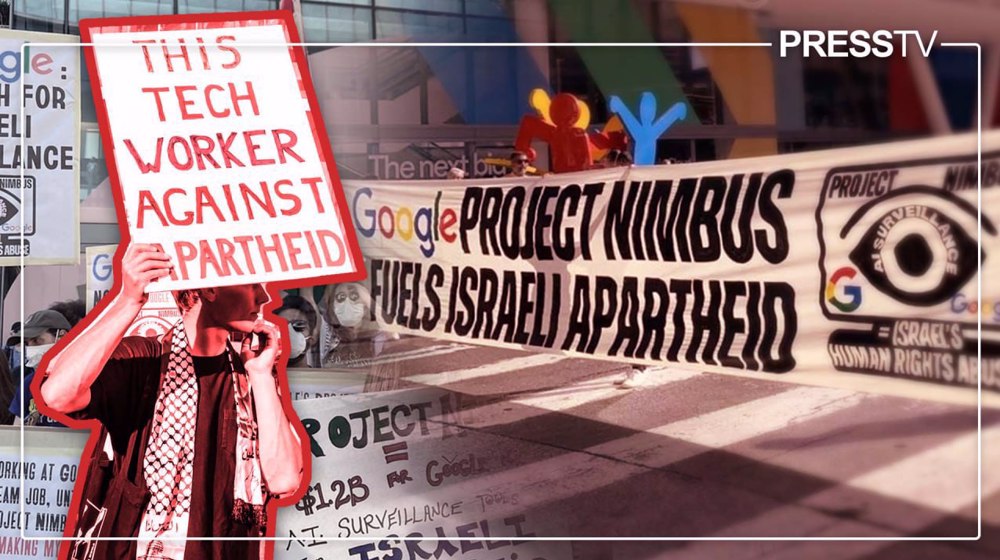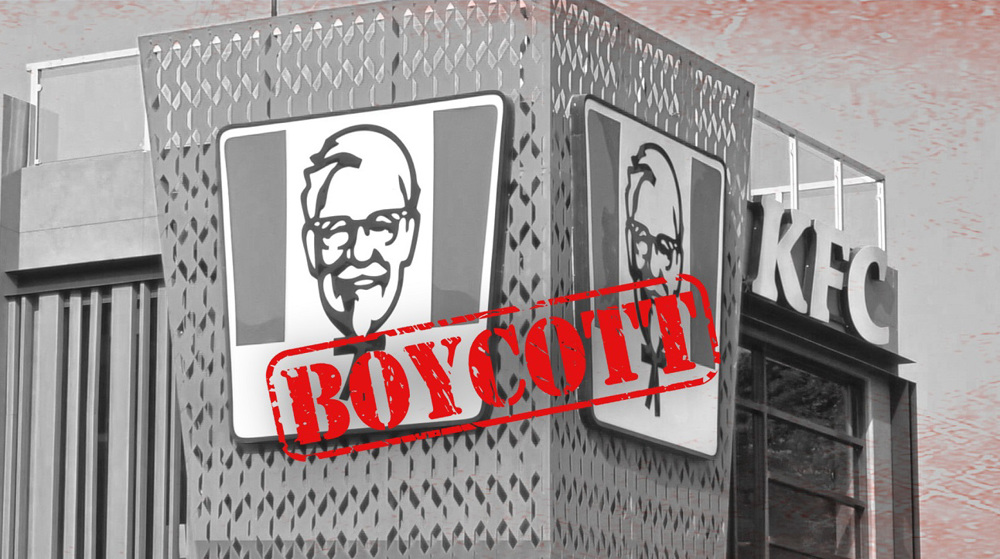Google, Amazon workers mount pressure on tech giants to snap ties with Israel
By Maryam Qarehgozlou
“No tech for apartheid! Stop the genocide,” shouted a Google Cloud software engineer, disrupting an annual conference that aimed to promote Israel’s tech industry, a key part of the occupying regime’s economy hit hard by its genocidal war against Palestinians in Gaza.
Mind the Tech, a two-day conference that opened in New York on Monday, saw widespread pro-Palestine protests, mostly targeting the controversial “Project Nimbus” contract, a $1.2 billion cloud computing project between Google, Amazon and Israel providing the illegal entity’s military occupation of Palestine with artificial intelligence (AI) surveillance support.
“I’m a Google software engineer and I refuse to build technology that powers genocide or surveillance,” shouted the cloud engineer, five minutes into the speech by Google Israel director Barak Regev.
“Project Nimbus puts Palestinian community members in danger! I refuse to build technology that is gonna be used for cloud apartheid,” he cried. “No tech for apartheid! Stop the genocide!”
The young engineer was then dragged out of the room by security agents present at the venue.
A minute later, another protester, an organizer with the anti-Zionist Israeli group Shoresh and Jewish Voices for Peace, interrupted Regev while he was delivering his remarks.
“Google is complicit in genocide,” the protester screamed. She was soon harassed by a nearby female attendee who pinned her down and then dragged her out of the conference room.
Outside the conference, anti-Israel protesters who rallied against Project Nimbus broke into chants of “Shame”, and “Free, Free Palestine.”
Protesters also held banners that read “No tech for Apartheid” and “Drop Nimbus.”
The New York Police Department’s Strategic Response Group (SRG), a so-called “counterterrorism unit” that works closely with the Israeli military, was mobilized around the corner of the building and a spy drone flew overhead.
‘Morally and professionally right’
The Google Cloud software engineer, who chose anonymity to avoid professional repercussions, told Hell Gate later that he considered their actions to be morally and professionally necessary.
“I don’t see any way forward to continue my engineering work without doing this; I consider this a part of my engineering works, and I hope other engineers within Cloud see me do this, and I hope that it galvanizes them,” he was quoted as saying.
On Friday, it was reported that the employee has been sacked by the company for expressing his public support for the Palestinians reeling under the Israeli regime’s bombings since October 7.
Google announced that the employee was fired for “interfering with an official company-sponsored event,” claiming that the behavior was “not okay” and “violated policies.”
In response, No Tech for Apartheid released a statement, accusing Google of muzzling free speech.
“Google has engaged in a clear-cut act of retaliation against its own worker for speaking up about the terms and conditions of their labor,” the group said in a statement.
“While terminating this brave worker, Google HR asked how they were feeling. The worker replied: ‘proud to be fired for refusing to be complicit in genocide’,” the statement added.
Zelda Montes, a software engineer for YouTube, who joined the protests outside the event venue told Hell Gate that she hoped their actions could inspire tech workers, especially Google tech workers, to act rather than accept the status quo as a given.
“We don’t have to live with genocide whatsoever—that’s not something that we have to concede to,” Montes said. “And we definitely have more worker power than I think people realize.”
Prior to the event, more than 600 Google workers signed a letter, demanding the company’s marketing leadership to drop its sponsorship of Mind the Tech conference.
“Please withdraw from Mind the Tech, issue an apology, and stand with Googlers and customers who are despairing over the overwhelming loss of life in Gaza; we need Google to do better,” read the letter which was first circulated inside Google on February 29.
The letter also highlighted Israel’s extensive bombardment of Gaza for almost five months, killing more than 30,800 Palestinians, and causing vast destruction of civilian infrastructure, including hospitals and the blockade of aid into the besieged territory amid a deteriorating humanitarian crisis.
It also pointed to the International Court of Justice (ICJ) interim ruling in late January which found the genocide case against Israel “plausible” and called on the regime to halt its genocidal actions.
Despite the backlash, Israel has been seizing every opportunity to resurrect its economy which has suffered one of its worst slumps due to the war against Gaza, paralyzing its businesses.
According to official figures, Israel’s gross domestic product shrank nearly 20 percent in the fourth quarter of 2023. Investment in Israeli tech startups and companies plunged 56 percent this year, compared with the same period in 2022.
What is Project Nimbus?
The protests at the conference were primarily organized by No Tech for Apartheid, a US-based campaign comprising tech workers, mostly employed by tech giants including Google and Amazon.
One of the campaign’s main focuses is Project Nimbus, signed between Amazon Web Services, Google Cloud executives and Israel in April 2021, almost a month before Israel’s devastating 11-day military offensive, launched on May 10, on the blockaded Gaza that killed 250 people, including 66 children.
Since its announcement, Project Nimbus has drawn widespread criticism, both inside and outside Google and Amazon, leading to employee-led protests and warnings from human rights groups and surveillance experts that it could deepen the repression of Palestinians.
“By doing business with Israeli apartheid, Amazon and Google will make it easier for [Israel] to surveil Palestinians and force them off their land,” No Tech for Apartheid said in a statement.
1 - From Berlinale to Venice Biennale, boycott calls against Israel grow louder pic.twitter.com/1p4z2ZxK87
— Press TV 🔻 (@PressTV) March 2, 2024
In October 2021, 90 Google workers and 300 Amazon workers published an open letter in the Guardian opposing Project Nimbus and urged the company leadership to uphold human rights, behave ethically and live up to its commitments.
Google has repeatedly stated that the company’s Nimbus contract only provides “commercial” services for Israeli regime ministries including finance, healthcare, transportation and education – not for “highly sensitive or classified military workloads relevant to weapons or intelligence services.”
However, in April 2021, the Israeli finance ministry announced the project is intended to provide its so-called “defense establishment” and others with an all-encompassing cloud solution.
In July 2022, documents obtained by the Intercept confirmed that Google is offering advanced artificial intelligence and machine-learning capabilities to the Tel Aviv regime through Project Nimbus.
It also showed that computing capabilities in Project Nimbus can be used in service of surveillance, an integral aspect of Israel’s occupation of the West Bank in particular.
“The sophistication of Google’s data analysis offerings could worsen the increasingly data-driven military occupation,” the report stated.
The documents also indicated that the new cloud would give Israel capabilities for facial detection, automated image categorization, object tracking, and even sentiment analysis that claims to assess the emotional content of pictures, speech, and writing.
Despite the dissent, Project Nimbus remains in place, partly because of contractual terms put in place by Israel forbidding Google from cutting off service in response to political pressure or boycott campaigns.
‘A betrayal’
When Israel began bombing Gaza on October 7, 2023, the two-year-old anti-Nimbus campaign once again reinvigorated, with protesters saying the contract is “fueling the genocidal assault on Gaza.”
In late October, former and current Google and Amazon workers denounced Project Nimbus again when they gathered outside Google’s New York City campus to pay tribute to Mai Ubeid, a young woman and software engineer who was killed in an Israeli airstrike in Gaza along with her whole family.
Ubeid had graduated from a Google-funded coding boot camp, Gaza Sky Geeks, and later interned at a firm that was part of the Google for Startups accelerator program in 2020. She had muscular dystrophy and, as such, used a wheelchair to get around.
However, according to several employees who spoke at the vigil, Google declined to publicly or internally acknowledge her killing by the Israeli regime or condemn it.
Mohammad Khatami, a Google software engineer and one of the organizers of the vigil, said the silence of the company and the chief executive, Sundar Pichai, on Ubeid’s death, was “a betrayal in the purest sense of the word.”
“No email, no difficulty, no decision, no public statement and absolutely no shame,” Khatami said at the vigil just outside Google’s offices. “Shame on [Pichai] and shame on Google.”
A broader trend
Less than a month into Israel’s war on Gaza, more than 1,700 Amazon employees presented CEO Andy Jassy with a petition calling for the company to “rescind all contracts with the Israeli military and call for an immediate, durable, and sustained ceasefire.”
At around the same time, an anonymous open letter was distributed internally by anti-Nimbus Google workers through company email lists that said Project Nimbus was contributing to Israel’s human rights abuses against Palestinians.
“Through Project Nimbus, Google is complicit in the mass surveillance and other human rights abuses which Palestinians have been subject to daily for the past 75 years, and which is the root cause of the violence initiated on October 7th,” the letter said.
“If we do not speak out now, we are complicit in what history will remember as a genocide.”
The anti-Nimbus campaign reveals a significant shift in the face of the US tech industry’s strong business ties to Israel. It also reflects a broader trend among Americans, who have increasingly called for Joe Biden’s administration to stop its unwavering support for Israel and put an end to the genocide in Gaza.
An Amazon employee, who spoke on the condition of anonymity to protect his job, was quoted by media as saying that support is growing for their bid to kill the Nimbus contract with Israel.
“I’ve been seeing a lot more solidarity and sympathy even among people who are not traditionally political,” said the employee.
ICC should issue more arrest warrants for Israeli authorities over Gaza genocide: UN expert
Israel using AI weapons co-produced by India in Gaza genocide: Report
Israel issues new evacuation orders, shortly launches strikes on southern Lebanon
VIDEO | Press TV's news headlines
From Iraq to Gaza: The great disconnect between British people and rulers
Syria condemns Israel's killing of 36 in 'horrific' strike on Palmyra
Iran rejects UN human rights resolution as politically-motivated, unjustified
US Senate rejects bids to halt military sales to Israel

















 This makes it easy to access the Press TV website
This makes it easy to access the Press TV website